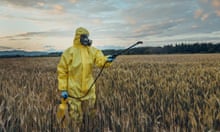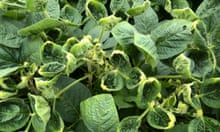Bee-killing pesticides have been found at dangerous levels in English rivers, as the government considers allowing the use of one that is banned in the EU.
Environmental groups and farmers are waiting to hear whether a toxic neonicotinoid, thiamethoxam, will be approved by the government for English sugar beet farms for a fourth consecutive year. Wildlife campaigners say it is “unacceptable” that ministers have “ignored the science” and allowed the use of these dangerous chemicals.
The matter was discussed at the latest meeting of the government’s expert committee on pesticides on 12 September. While the pesticide has been banned in the EU for years, it was allowed for emergency use until this year, when it was banned entirely. Now the UK has left the EU it is able to make its own rules on pesticides. Recent research found that 36 pesticides banned by the EU are not ruled out for use in the UK.
The pesticides are toxic for bees but are also, at certain levels, toxic to aquatic life, and build up in river systems.
New research by the Rivers Trust and Wildlife and Countryside Link (WCL) found that one or more of five neonicotinoids – four of which are banned in the EU – were found in more than one in 10 English river sites tested by the Environment Agency (29 of 283 sites). At 55% of these 29 sites one or more neonicotinoids were above the EU’s proposed environmental quality standard (EQS) – the level deemed safe for aquatic wildlife. Twenty one per cent of sites had one or more toxic pesticide at over four times the safe level.
Rivers most affected by the pesticides were found in the east of England, south-east England and West Midlands in rivers including the Ivel, Waveney, Nene, Ouse and Tame.
Barnaby Coupe, the land use policy manager at the Wildlife Trusts, said: “This research reveals that our rivers and waterways are plagued by a cocktail of neonicotinoid pesticides, despite these chemicals being banned since 2018.
“It is completely unacceptable that the government is allowing these chemicals to pollute the environment when the evidence for the disastrous impact of neonicotinoids grows year on year. It has ignored the science and the advice of its own experts in granting repeat authorisations to apply toxic neonicotinoids to our countryside, and the result is much diminished wildlife.”
Gareth Morgan, the head of farming at the Soil Association, said: “Year after year this failure to help farmers has led to the suspension of the so-called ban on these bee-harming pesticides. With so much of British wildlife in decline, it is critical that the government stops kicking the can down the road on this issue. Organic and agro-ecological farmers are proving that food can be produced without pesticides. Government must act now to help all farmers switch to nature-friendly practices across their entire farms. We must stop simply reaching for another toxic solution.”
after newsletter promotion
A spokesperson for the Department for Environment, Food and Rural Affairs said: “Our comprehensive plan for water is tackling every source of pollution through more investment, stronger regulation and tougher enforcement, while ensuring the use of pesticides does not harm people or pose unacceptable risks to our rivers.
“In our forthcoming pesticides action plan we will also set out our ambition to minimise the risks and impacts of pesticides through an increased uptake of integrated pest management across all sectors. More widely, we have more than doubled the funding to help farmers to improve slurry management, while also expanding our sustainable farming incentive offer to pay farmers to reduce their use of insecticides.”








